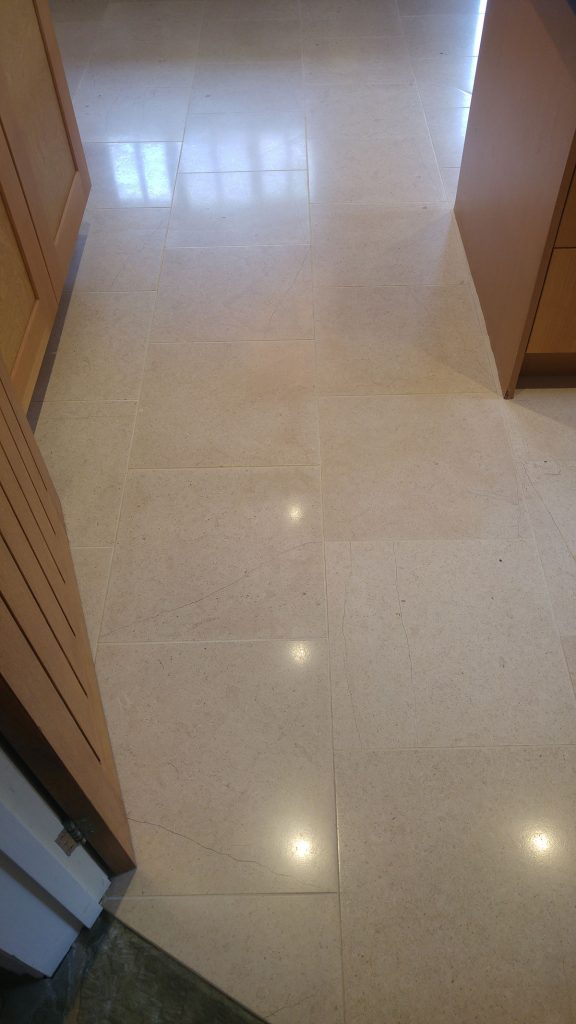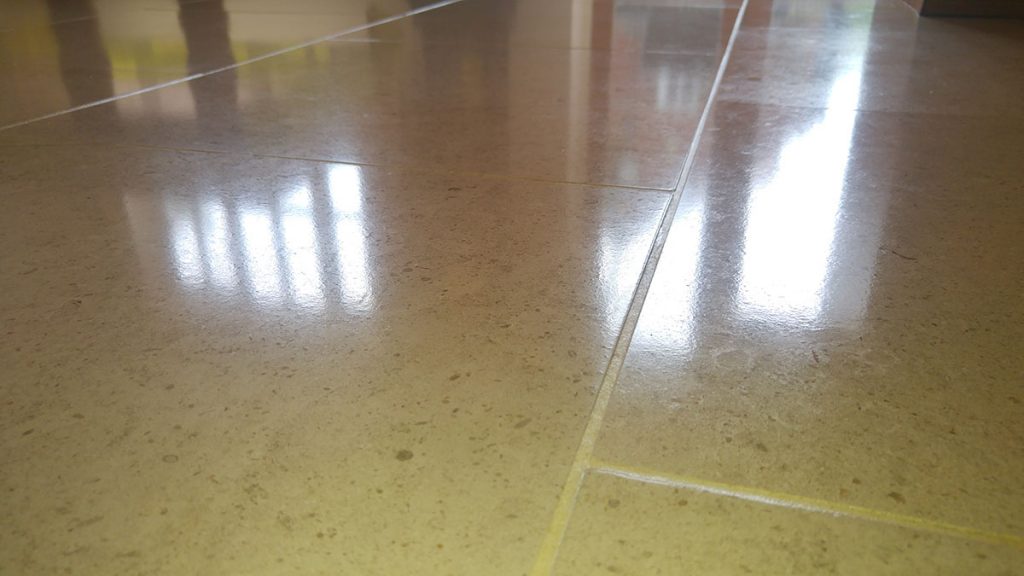
Limestone Floors
Limestone has never been more popular. With a variety of colours and styles available it’s an excellent choice. But do you know how to look after it?
About Limestone?
Limestone is formed at the bottom of the ocean and is a sedimentary rock. It mainly consists of calcium carbonate and skeletal fragments of marine organisms such as coral, forams and molluscs.
Visually limestone varies considerably depending on how much calcium is present in the stone. High calcium will have a very light colour, with iron oxide giving almost a tan colour, with higher levels of carbon giving a grey or even black colour. Add to this the level of impurities and the distribution of fossils gives for some unique and beautiful floors.
Limestone is very porous and is essential its sealed when new, and after deep cleaning, this is often the reason why people struggle to maintain Limestone. It is however quite tough measuring 3-4 on the Mohs scale. The Mohs scale is a system of measuring how hard a material is, 1 being Talcum powder, and 10 being Diamond.
Why not ask us about our maintenance plans to keep your floor looking good all year round?
Cleaning & Restoration
Deep Clean
Firstly, we cover and protect any kitchen units, paintwork, and any joining rooms and flooring that may be affected during the process. We treat every home as if it were our own taking upmost care in what we do being of up most importance.
Step one is to pre-treat your floor with our specialist solutions, we have a variety of cleaners at our disposal determined by the type and degree of soilage. We then leave these solutions to dwell and do their job detaching the dirt from your floor. Without allowing the solutions to dry we then agitate the solutions into the floor, using a combination of our rotary, contra rotating brush machine and our specialist tile master machine. This step gets the solutions deep into those problematic grout joints, also removing all surface dirt, grease and marks.
Next, we use our impressive van mounted extraction machine to rinse the solutions off your floor, taking all the dirt with it. We can rinse your floor at up to 1000psi of pressure without making as much as a splash. Often 1000psi isn’t required, we don’t need to rely on high pressures to clean your floor, it does however ensure all solution and dirt residue are fully removed and neutralised before the next process.
These two process are often repeated 2-3 times, this is to use different agitation machines to combat different areas of your floor, along with using different solutions, again to deal with any other problematic areas, for example grease next to the cooker, or engrained dirt where your wellies sit to dry!
We always carry out a free no obligation trial to not only show you what we can do, but also to discuss your specific requirements, and to give you all the options that are achievable with your floor.
Filling Holes and Cracks
Often, we find holes caused by footwear or furniture, and cracks most commonly across doorways. We can fill these cracks with our stone filler, it’s a mastic made of polyester resins which is possible to polish in line with the desired shine on your floor and should prevent further damage, and dirt ingress into the holes.
Polishing and Honing
On some floors a clean may be all that’s required, but if your floor is looking dull, scratched, or looks etched, or even if you just want a higher sheen, or even a matt finish, this is next process to achieve your desired finish.
All Limestones are different, some will take a high sheen, others are designed to have a matt or honed look. This is one of the many reasons why we always trial floors first to determine your options, and what is possible on your floor.
We can produce a natural sheen using diamond encrusted pads on a weighted rotary machine to achieve a polished look. Like using sandpaper on wood, we have to work through various grit pads to firstly remove scratches, then build up the sheen in up to 5 steps. Using this, and a combination of polishing powders where necessary, we are able to get the desired results.
If a honed finish is more to your liking, we can offer this too. In a similar way to polishing we use different grit pads to leave a smooth matt looking finish ready to be sealed.
Sealing your Limestone Floor
It’s very important to seal your Limestone floor. Unsealed is unprotected and being a very porous stone it will allow liquid spills and even dirty mop water to penetrate and potentially permanently stain your floor. Sealing also helps with your ongoing maintenance.
We use the best premium impregnating seals on the market. Being an impregnating sealer, they don’t sit on the top of your floor, but sit just below the surface to give a natural look to the floor. Using an active compound resin that becomes part of the stone, your tiles and grout are protected from dirt, grime and daily food spills with an invisible and breathable barrier.
Benefits of sealing your floor:
- Gives excellent protection against both oil and water based stains
- Laboratory certified as Safe for food preparation areas and worktops
- Protects and seals both indoor and outdoor surfaces
- Easy to apply and Ready to USE
- Does not change the appearance of most surface types
- Aids maintenance and makes it easy to clean your floor
Don’t forget to ask us about our maintenance care plans to keep your floor looking great all year round!
Please get in touch if you need help restoring your Natural Stone Floor in Worcestershire, Gloucestershire or Warwickshire. We would love to hear from you!



